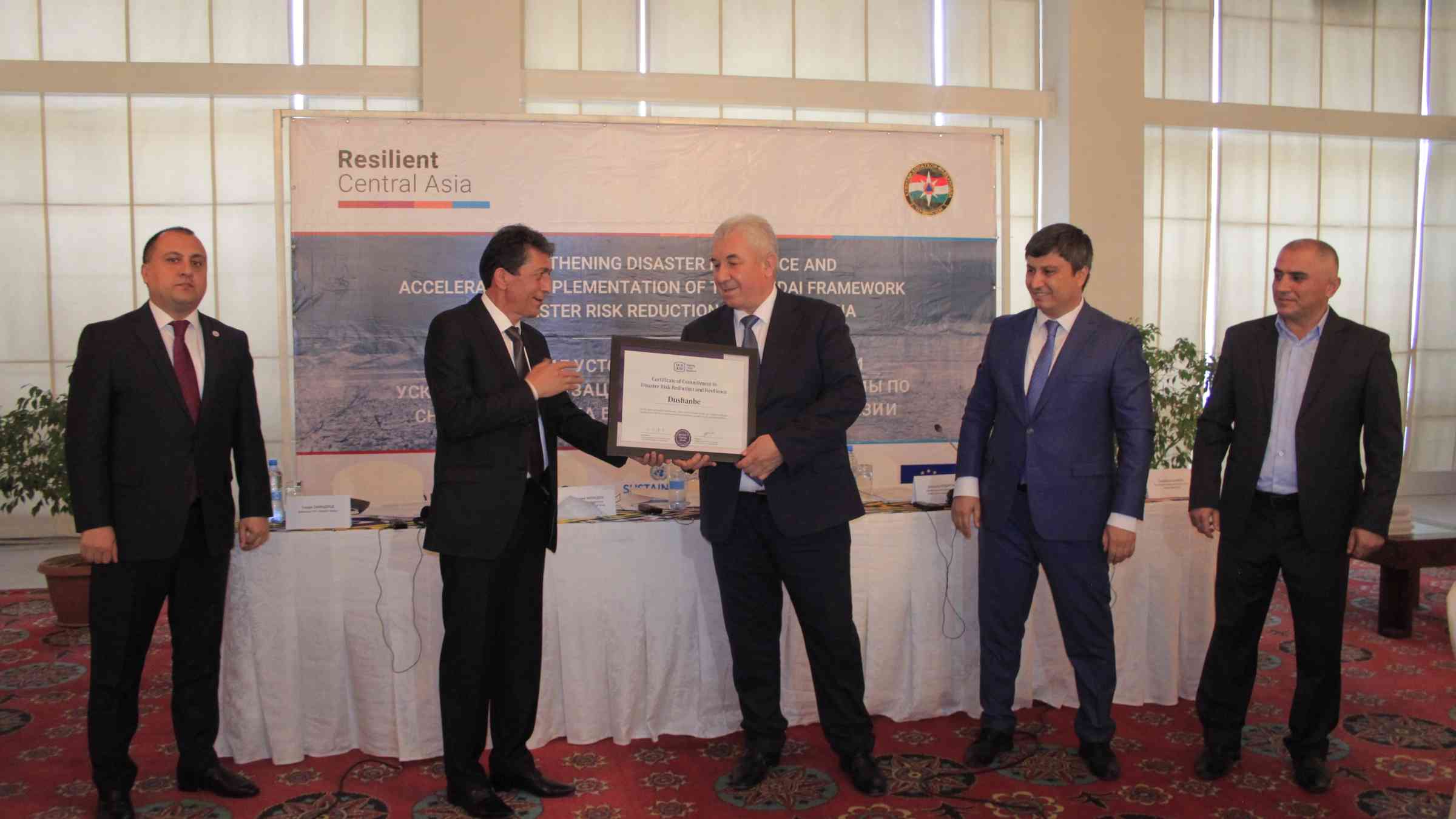Dushanbe, the capital city of Tajikistan, launches development of the City Resilience Strategy and Action Plan that will include pandemics and biological hazards

DUSHANBE – On 11-12 August, the City of Dushanbe in collaboration with the United Nations Office for Disaster Risk Reduction Regional Office for Europe and Central Asia (UNDRR ROECA), conducted the first Self-Assessment Workshop on city's resilience to disasters using “Public Health System Resilience Scorecard” and “Preliminary Disaster Resilience Scorecard”.
This work is part of the “Strengthening disaster resilience and accelerating implementation of Sendai Framework for Disaster Risk Reduction in Central Asia” initiative, implemented by UNDRR ROECA with funding from the European Union.
The workshop took place just as the city of Dushanbe officially joined the Making Cities Resilient 2030 (MCR2030) initiative and expressed its commitment to disaster risk reduction and building resilience. Being part of this initiative will allow Dushanbe to increase local resilience through advocacy, the exchange of knowledge and experiences, and the establishment of learning networks between cities to achieve the goals established in the 2030 Agenda for Sustainable Development and the Sendai Framework 2015-2030.
The Technical Working Group established by the Executive Body of State Power in the City of Dushanbe and composed of over 40 representatives of the local and national government as well as risk analysis institutions, aims to develop by August 2022 the City Strategy and Action Plan for Disaster Risk Reduction for Dushanbe. The Strategy and Action Plan will be based on multi-hazard approach, addressing amongst other pandemics and biological hazards. Experience from past epidemics and the current COVID-19 pandemic demonstrates the importance of coordination and cooperation between disaster managers, health workers and other sectors.
Mr. Amirkhon Kurbonzoda, First Deputy Mayor, stressed: “The intention of Dushanbe to join the Global Initiative for Making Cities Resilient 2030, is to assess the resilience of Dushanbe to disasters and develop a draft Strategy and Action Plan for Strengthening the City's Resilience to Disasters. By joining the global network of global cities, the City of Dushanbe has demonstrated its commitment to take action to ensure the safety and well-being of citizens during disasters and crises.”
Mr. Octavian Bivol, ROECA Chief, said: “I would like to take this opportunity to welcome the strong collaboration between UNDRR and the Government of Tajikistan. UNDRR’s support to Dushanbe for the development of a local resilience strategy and action plan constitutes a first concrete step in Dushanbe’s membership of the Making Cities Resilient 2030 initiative and is made possible through the initiative "Strengthening Disaster Resilience and Accelerating the Implementation of the Sendai Framework for Disaster Risk Reduction in Central Asia", funded by the European Union.”
Mr. Giuseppe Aristei, representative of the European Union, noted: “Our focus today is improving city resilience, which means for a City to enhance its ability to bounce back and grow even stronger and better in the face of the chronic stresses and acute shocks associated with natural and man-made hazards. To this end we will have the opportunity to discuss about the initiative ‘Making Cities Resilient 2030’ and other useful tools and proposals for a better preparedness and for guiding cities on how to improve resilience overtime.”
UNDRR has called on national and local disaster management agencies globally to include health emergencies in the discussion on disasters, as a top priority, alongside earthquakes, floods, storms and other natural hazards.
Tajikistan is prone to many types of hazards, including avalanches, droughts, earthquakes, epidemics, floods, heat waves, insect infestation, landslides, mudflows and windstorms.
Background information
The EU-funded project “Strengthening disaster resilience and accelerating the implementation of Sendai Framework for Disaster Risk Reduction in Central Asia”, implemented by the United Nations Office for Disaster Risk Reduction (UNDRR), aims to support countries of the region in implementing the Sendai Framework priorities. The project supports strengthening regional coordination, development of regional DRR strategy, national disaster loss accounting systems, and community-level disaster risk reduction. On the local level, the project supports the development of disaster resilience strategies of capital cities. For this project, the EU committed EUR 3,750,000 for the three-year implementation.
MCR2030 is a global partnership of key partners with expertise and networks across urban resilience, DRR, climate change and the Sustainable Development Goals to bring synergized collaboration. The MCR2030 initiative builds on a decade-long of advocacy and capacity-building work that reached more than 4,000 cities across the globe within the network of the Making Cities Resilient Campaign. The initiative seeks to provide guidance and support to enhance understanding of risk reduction and resilience, to improve strategic planning and build resilience, as well as to take actions. It supports, connects, and facilitates resilience-building, offering a range of tools and services including peer-learning and knowledge exchange amongst cities.
For additional information please contact
- Ms. Yerkezhan Amriyeva, Communications specialist, EU Delegation to Kazakhstan, at: [email protected]
- Mr. Abdurahim Muhidov, UNDRR Regional Programme Coordinator, at: [email protected]

